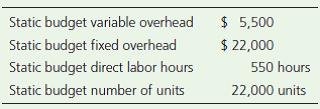Review the results from Exercises E23- 19 and E23- 20. Record the journal entries to record direct
Question:
Review the results from Exercises E23- 19 and E23- 20. Record the journal entries to record direct materials, direct labor, variable overhead, and fixed overhead, assuming all expenditures were on account and there were no beginning or ending balances in the inventory accounts ( all materials purchased were used in production and all goods produced were sold). Record the journal entries to record the transfer to Finished Goods Inventory and Cost of Goods Sold. Adjust the Manufacturing Overhead account.
Data from Exercise E23-19
Great Fender, which uses a standard cost accounting system, manufactured 20,000 boat fenders during 2014, using 144,000 square feet of extruded vinyl purchased at $1.05 per square foot. Production required 420 direct labor hours that cost $13.50 per hour. The direct materials standard was 7 square feet of vinyl per fender, at a standard cost of $1.10 per square foot. The labor standard was 0.025 direct labor hour per fender, at a standard cost of $12.50 per hour. Compute the cost and efficiency variances for direct materials and direct labor. Does the pattern of variances suggest Great Fender’s managers have been making trade-offs? Explain.
Data from Exercise E23-20
Review the data from Great Fender given in Exercise E23-19. Consider the following additional information:

Great Fender allocates manufacturing overhead to production based on standard direct labor hours. Great Fender reported the following actual results for 2014: actual variable overhead, $4,950; actual fixed overhead, $23,000.
Step by Step Answer:

Horngrens Financial and Managerial Accounting
ISBN: 978-0133255584
4th Edition
Authors: Tracie L. Nobles, Brenda L. Mattison, Ella Mae Matsumura





